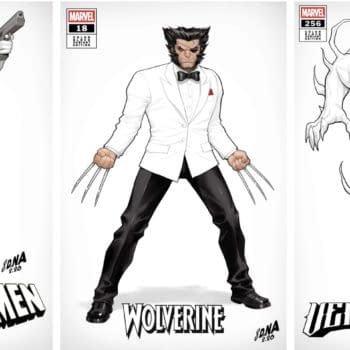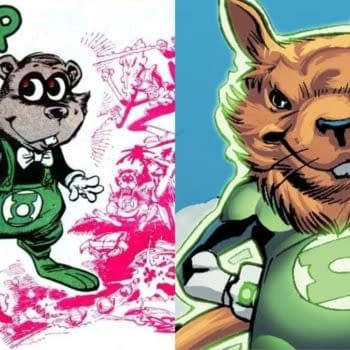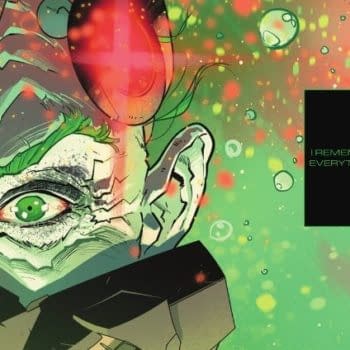Posted in: Comics, Recent Updates | Tagged: Aura, Broadcast Thought, Comics, Dr. Vasilis Pozios, entertainment, GrayHaven Comics, indie Comics, mental illness, you are not alone, You Are Not Alone 2
Mental Illness, Superheroes, And Stereotypes – Vasilis Pozios On His New Comic Aura
By Nikolai Fomich
Psychiatrist Vasilis Pozios and renowned illustrator Marguerite Sauvage have joined forces to create Aura, a new super-powered hero – who also happens to have Bipolar Disorder. I spoke with Vasilis about this new character and the portrayal of mental illness in comics.
Nikolai Fomich: Vasilis, who is Aura? What is your comic about?
Vasilis K. Pozios: I suppose I should first explain why a forensic psychiatrist is writing a comic book!
As a physician specializing in psychiatry, I have a responsibility to advocate for people with mental illnesses and for improved mental health care in society. Those who are familiar with the work that my colleagues and I at Broadcast Thought have done know that we're passionate about reducing the stigma associated with mental illnesses and their treatment through more accurate depictions of mental health issues in the media. Thus far, we've approached this through informing the lay public – including creators of popular media – about mental health issues using popular culture as a vehicle for discussion.
In addition to consulting with creators on depictions of mental health issues in popular media, we're taking further steps to create original content that's representative of our mission. And, since I've loved comic books for as long as I can remember, making comics is not only the logical entry point for this organic evolution, but also a dream-come-true. And thus was born Aura!
Aura is the super-hero alias of a young woman named Alexis Pope. Alexis has Bipolar Disorder and has survived a suicide attempt. She also has migraine headaches (not uncommon in people with Bipolar Disorder) with visual aura – although Alexis' auras are far from typical, as you'll see in the story. Alexis' narration conveys the struggles she's faced not only as a direct result of her mental illness, but also through the indirect consequences of having a mental illness, i.e., the stigma associated with illnesses like Bipolar Disorder. This narration is juxtaposed against various manifestations of prejudice and discrimination encountered by Alexis as she commutes to her appointment with her psychiatrist.
The sources of stigma surround us. Popular media shape our thoughts, feelings, and behaviors toward people with mental illnesses, and I wanted to capture this in the story. You may be surprised to realize how often we unwittingly engage in the stigmatization of people with mental illnesses. For example, would your opinion of a person change if you learned they've been treated in a psychiatric hospital? This is the sort of self-reflection I am hoping to elicit with Aura.
NF: Aura is clearly a very personal character for you. Talk a bit about the development of this unique creation. How did you and your collaborator Marguerite Sauvage come up with Aura?
VKP: Aura was really born out of necessity. I had first learned of the anti-bullying anthology, You Are Not Alone, from my friend and former writing seminar classmate, Dave Ebersole (co-creator with Delia Gable of the forthcoming supernatural noir detective series Dash from Northwest Press). So when I saw a "last call" solicitation for submissions to You Are Not Alone 2, I figured I'd give it a shot. I had three hours to come up with a pitch, and since it's such a short story (four pages), I had to be concise with my message and storytelling.
There were a few core elements I knew had to be a part of my story. First, I really wanted to convey that bullying doesn't have to be active – it can include passive discrimination and prejudice, like the stigma people with mental illnesses face on a daily basis. Second, I wanted to portray a comic book character with a mental illness who is a hero, not a villain. That was really important to me, as well as depicting what mental health treatment is actually like – including both the "pros" as well as the "cons." Third, and finally, although the story features a character with a mental illness, I didn't want mental illness to define the character. Although in the story you're only seeing a glimpse into the life of Aura, I tried to express the idea that her illness and treatment, while not insignificant, are not synonymous with who she is as a person. Alexis is really invested in recovery, moving forward, and living her life as a hero who happens to have a mental illness.
Hopefully, those elements come across in four short pages! Marguerite Sauvage did a bang-up job, in my humble opinion, of telling a fluid, dynamic story. And I love her costume design for Aura! I think it's reminiscent of '80s teenage super-heroes like The New Teen Titans but with some more modern design elements. I can't overstate how very fortunate I was to be able to work with Marguerite. (For those who are not familiar with Marguerite's work, check out Sensation Comics #3 from DC Comics, on sale in October.)
NF: People with mental illness are rarely portrayed in popular culture sympathetically – in fact, it seems as though they're most often portrayed as villains, like Hannibal Lecter or the Joker. What are your thoughts on the portrayal of the "mentally ill" in popular culture generally and in comics specifically? What do you think that says about us a society?
VKP: The portrayal of comic book villains perceived to have mental illnesses – and the trope of villainy being caused by mental illness – reinforces negative stereotypes we have as a society about mental illness, criminality, and violence. While in the real world, mental illness is a rare cause of violence, accounting for about 3-5% of societal violence, in popular fiction (especially comic books, it seems), mental illness is almost synonymous with violence.
You might say, "What's the big deal? It's just a comic book." Well, the issue is that these negative stereotypes, informed by media portrayals, form slowly and insidiously [and] lead to real-life discrimination and prejudice against people with mental illnesses. Negative stereotypes of people with mental illnesses are particularly vexing because many people don't have an intuitive frame of reference to counterbalance these negative stereotypes. Moreover, our brains are actually hard-wired to preferentially accept negative stereotypes over actual information. This perpetuates the stigmatization of having a mental illness and receiving treatment, deterring people who would benefit from treatment from receiving it. What's more, mental health stigma has social, economic, and other impacts that directly and indirectly reduce the quality of life of people with mental illnesses.
In many ways, the same logic can be applied to why we should care about how women, ethnic minorities, and people of different sexual orientations and genders, for example, are represented in comics and other media. What if every African American character was depicted as a villain? Or every female character over-sexualized? Clearly, such depictions would be way off-base! We care about these depictions not being representative of real people not just because inaccurate depictions can be insensitive or even offensive, but because media, including entertainment, can influence our beliefs and subtly inform our behaviors in both positive and negative ways. So why is the misrepresentation of mental illness any different?
Recently, there have been more positive portrayals of people with mental illnesses in television and film. Homeland, Perception, and Silver Linings Playbook are just some examples. However, in some cases, the pendulum of portrayals swings a bit too far in the opposite direction – portraying mental illness as some sort of "super power" or creating a false dichotomy between being brilliant but unstable when off treatment and being uninspired but stable while on treatment. My goal with Aura is to present a more accurate depiction of what it's like to have a mental illness.
NF: Aura is a sharp departure from the kinds of stereotypes that you mention. How exactly does Aura differ from these stereotypes? And how did your experience as a psychiatrist influence your portrayal of her?
VKP: You always hear people say, "Write what you know." Having a background in psychiatry helps me to incorporate more accuracy into the story, which, if done responsibly, can also make the characters more compelling and the story more engaging. So, it's not just a technical accuracy, it's accuracy on all levels – the emotional response to having a mental illness, the struggles, the victories, everything.
We see many mental health-related stereotypes and tropes in comics: psychiatric treatment as cruel punishment, psychiatrists having sinister, ulterior motives, characters perceived as having psychiatric issues depicted as villainous (and vice versa), and so on. In Aura, you won't see any straitjackets, padded cells, or the like; I wanted to portray mental health treatment as it is in the real world. The stereotypes and tropes become apparent through the juxtaposition of stigmatizing imagery against the non-stigmatizing, reality-based character of Alexis Pope.
NF: While it's certainly important to challenge negative stereotypes, it's just as important for a story to be more than a mouthpiece for social causes. How did you find that balance – how did you remain sensitive to mental health issues while still creating a fascinating character and story?
VKP: Absolutely. I didn't want this story to be "a very special episode of…" Instead, I wanted the character to be three dimensional, with the larger messaging woven into the tapestry of the story. For Alexis, having a mental illness is only part of who she is. It may present challenges for her, but it doesn't define her. And of course, this holds true for people who have mental illnesses in the real world, and hopefully that's something readers take away from the story.
Aura exists because I wanted to demonstrate that accurately incorporating mental health issues into a comic book doesn't mean the comic book has to be about mental health issues – nor should it. For example, no one would say Batwoman is about a gay superhero, although Kate Kane's sexual orientation certainly is part of who that character is. And, as I said previously, if done responsibly, more accurate representations of people with mental illnesses in fiction can add depth to characters and stories while helping to lessen mental health stigma.
[Aura Page 3]
NF: Your four page mini-comic gives us a glimpse into the mind of Alexis Pope and her struggles. What do you have planned for her next? When can we see more of Aura?
VKP: First, I want to thank GrayHaven Comics, Andrew Goletz, Marc Lombardi, and last, but certainly not least, our editor, Glenn Matchett, for the opportunity to bring Aura to life. The anti-bullying anthology, You Are Not Alone 2, will be available later this month for purchase on GrayHaven's website. There are some great short stories in the anthology, including those from Glenn Matchett, Chip Reece (Metaphase), and many others. Please do check it out!
I also want to thank the brilliant Aaron Sechrist (OkPants) for designing the Aura logo, and of course, many, many thanks to the amazingly talented Marguerite Sauvage, whose name I'm sure will become familiar to comics fans in coming years.
As far as future plans go, I'd like to make Aura as accessible as possible. I'm currently exploring the possibility of making a full-color, digital version of Aura available for download. Also, Marguerite has expressed an interest in collaborating with me on an Aura mini-series, so we'll soon be working on a pitch for that. Making comics is fun stuff!
Finally, thanks to Bleeding Cool and Nikolai Fomich for your interest in Aura!
NF: You're welcome Vasilis!
Follow Dr. Vasilis Pozios and his fellow members of Broadcast Thought @BTdocs
Nikolai Fomich is a college teacher and writer in Philadelphia. Follow him @brokenquiver



















